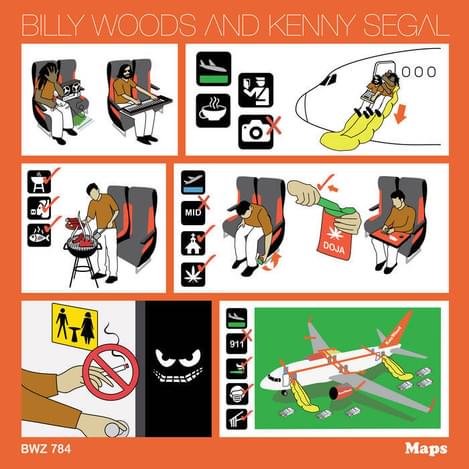billy woods and Kenny Segal excellently channel restlessness into Maps' conceptual nature
"Maps"

Billy Woods has always made hood-up, head-down music.
Over a remarkably prolific decade, he’s cut records of the quality which made Kendrick Lamar an icon but has remained, appropriately, a near total-unknown. It doesn’t help that, throughout his entire career, he’s hidden his face from view. Blurred, pixelated, masked; it would be hard to find a picture if you wanted to. I saw him live as half of Armand Hammer last summer and I still don’t know what he looks like, because he spat into the mic with a surgical mask hitched high above his nose, long after the crowds had stopped wearing them.
Likewise, his music provides discomfort as much as it does entertainment. His songs rarely dole out a hook, his rhymes are often metaphorical and astrophysical. There’s a creeping sense of paranoia throughout. Woods remains suspicious of many things: of gentrification, of sell-out rappers, and of the true intentions of his peers. “People don’t want to truth” he says, “they want to hear that grandma went to heaven”. Maps, Woods’ second collaboration with Kenny Segal is all of that… but on tour!
Yes, following 2015’s Today I Wrote Nothing (a project-length ode to writer’s block), this is his second concept album, this time about life on the road. Accruing a growing cult following worldwide, Woods has found himself playing the small stages and dank clubs of Europe for the first time in his long career. But this is no summer road trip. The transition from being broke to playing music in a new continent would be a great upheaval for anybody, never mind a rapper whose pen tends to pick at life’s details like tweezers prod a scab. Because of this, Maps is an album of sheer restlessness. In half-sketched scenes scattered through seventeen tracks, here is a protagonist who is perpetually on planes, in Ubers, or alone in hotels, staggering down to afterparties filled with hipsters and cut glasses. His verses float through these scenes with the fog of a week-long jet lag.
Woods’ writing remains as exquisite as it has been for eleven straight years. His words locate the psychedelic in the ordinary. “I don’t sleep” he raps, “I hover outside myself, watching my body survive”. That line – “I don’t sleep” – pops up again and again throughout the album, becoming both funnier and scarier in each new version. Unusually, he also offers autobiographical details so specific that it feels effortless to slip inside his shuffling shoes. “It’s 2-4-1 on the daiquiris / it ruins the whole day when my baby mother mad at me”.
The result is a complete picture of an artist in motion, with lyrics so vivid they might as well be vignettes from short stories. A song like ‘Hangman’ is essentially perfect: so taught and focused it sounds like a man hunched over, mouth open, pouring every one of his pressing thoughts onto the mic. The guest spots here are fantastic too; we get the pleasure of hearing Woods trade bars with the equally verbose Aesop Rock, while Danny Brown is manic and boastful on "Year Zero".
Despite its skittishness, Maps is actually noticeably sunnier than usual Billy Woods albums. Kenny Segal adorns the beats with wilting sax lines and twinkling pianos which are less dissonant than Hiding Places, where half of the songs sounded like heart palpitations and the other half induced them. Future Island’s Sam Herring offers a chorus on lead single "FaceTime", a song which finds solace in solitude.
It’s on "Soundcheck" that Woods comes closest to harmony: resisting his role as the star of the show while finding joy in new spaces. “I won’t be at soundcheck” he raps, “might watch the sunset over your city from a parapet or park bench”. Woods presents a complicated dynamic but a contented one. He’s a man ill-at-ease with his profession, his place in the industry and within society, but at least he’s another great album closer to being comfortable with himself.
Get the Best Fit take on the week in music direct to your inbox every Friday

Tunde Adebimpe
Thee Black Boltz

Julien Baker & TORRES
Send A Prayer My Way

Bon Iver
SABLE, fABLE





